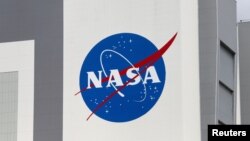A NASA researcher and Texas A&M University professor pleaded guilty to charges related to hiding his ties to a university created by the Chinese government while accepting federal grant money.
Zhengdong Cheng pleaded guilty to two counts — violation of NASA regulations and falsifying official documents — during a hearing in Houston federal court Thursday.
Cheng's conviction was part of a program called the China Initiative, which was first started under the Trump administration. But in February, the Justice Department abandoned the program after complaints it chilled academic collaboration and contributed to anti-Asian bias. The department had also endured high-profile setbacks in individual prosecutions, resulting in the dismissal of multiple criminal cases against academic researchers in the last year. The Justice Department said it planned to impose a higher bar for such prosecutions.
Cheng had originally been charged with wire fraud, conspiracy and false statements when he was arrested in August 2020. But he pleaded guilty to the new charges as part of an agreement with federal prosecutors.
U.S. District Judge Andrew Hanen sentenced Cheng to the time he had already served during his pretrial incarceration — about 13 months.
Cheng also agreed to pay restitution of $86,876 and pay a fine of $20,000.
Philip Hilder, Cheng's attorney, said the professor was "relieved that this unfortunate chapter of his life is behind."
But Hilder was critical of the China Initiative program, saying while its original purpose was "to fight economic espionage ... that was not the case in his matter."
"The China Initiative ... has now been phased out as a Justice Department priority. The overall mission stays the same, to ferret out economic espionage, but the focus is to target wrongdoers by their deeds and not by their ethnicity," Hilder said.
Prosecutors accused Cheng, who was hired by Texas A&M in 2004, of concealing his work in China even as his team of researchers received nearly $750,000 in grant money for space research. NASA is restricted from using funds for any collaboration or coordination with China, Chinese institutions or any Chinese-owned company.
But, prosecutors say, Cheng violated those restrictions by maintaining multiple undisclosed associations with China, including serving as director of a soft matter institute at a technology university in Guangdong, China, that was established by China's Ministry of Education.
"Texas A&M and the Texas A&M System take security very seriously, and we constantly are on the look-out for vulnerabilities, especially when national security is involved," John Sharp, chancellor of the Texas A&M System, said in a statement Friday. "We will continue to work with our federal partners to keep our intellectual property secure and out of the hands of foreign governments who seek to do us harm."
Cheng was fired from Texas A&M shortly after his arrest. Texas A&M is located about 145 kilometers northwest of Houston.
Hilder said Cheng loves academia but is evaluating his options on what he does next.
"He's a proud, loyal United States citizen and he looks forward to getting back to being a productive member of our society," Hilder said.
In a tweet Friday, FBI Houston Special Agent in Charge James Smith said his agency "prioritizes investigating threats to academia as part of our commitment to preventing intellectual property theft at U.S. research institutions and companies."
In February, Assistant Attorney General Matthew Olsen told reporters he believed the initiative was prompted by genuine national security concerns. He said he did not believe investigators had targeted professors on the basis of ethnicity, but he also said he had to be responsive to concerns he heard, including from Asian American groups.









